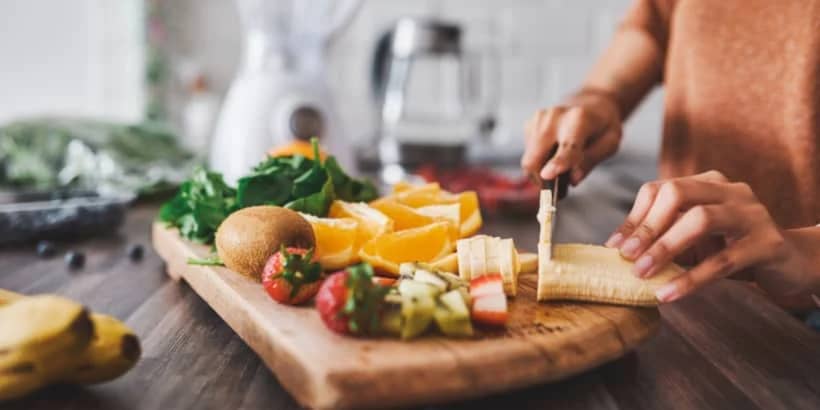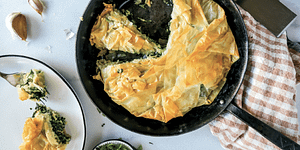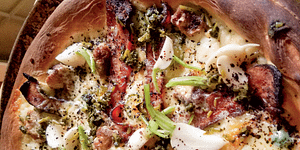The Key to Building A Long-Lasting, Healthy Diet

In reality, a healthy diet isn’t actually a strict one. Having a healthy diet means listening to what our body tells us and implementing a few small lifestyle changes. In his upcoming book The Virus and the Host, Dr. Chris Chlebowski outlines the tools we need to achieve better health and fight against infectious viral disease.
The following is an excerpt from The Virus and the Host by Chris Chlebowski. It has been adapted for the web.
Learn to Listen to Your Body
If you turn on the TV, you will likely be bombarded with commercials telling you what to consume and to squash or destroy your hunger the moment you feel the slightest discomfort. By contrast, I consider hunger to be like any other sensation or emotion: It is normal, and it should be present sometimes. Just as an emotionally balanced person will sometimes feel anxious, sad, elated, or angry, a physiologically balanced person will sometimes feel cold, tired, and hungry. These are sensations our bodies can handle!
If we never experience hunger, how will we ever know when to eat? Squashing hunger never gives us the chance to consider if we really need to eat or if, perhaps, we are experiencing something else masquerading as hunger—like anxiety, sadness, or boredom. Frequent or periodic fasting reminds us that we can go without food, for hours or even days, and it is quite good for us.

Paying attention to your body’s response to food is an important tool for lifelong good health. No one—no doctor, no healer, no guru, no dietitian, no health coach, no one—understands your body the way you do. When we listen to the signs and symptoms our bodies present, we can make the best possible choices about what we eat. This requires work and a refinement of our senses, but it’s so worth it.
Food provides an excellent feedback loop; within minutes we receive information on whether or not that thing we just ate was a good choice. Just as we might notice that we don’t feel well if we are talking to a certain person or engaging in a particular activity, food provides us with the same information—if we choose to listen to it. When you start to pay attention to your body’s response to eating, you may notice some of the following signals, which can give you valuable information about making intelligent decisions in the future:
|
|
Any of these symptoms can arise within minutes of eating—in some people almost instantaneously. Keeping a journal is an excellent way to start to pay close attention to what you eat and how it is affecting your health, both immediately and over time. If your symptoms are too numerous or there are too many background symptoms, you might consider running a food sensitivity test to narrow down the foods and their resulting symptoms that are standing in the way of your wellness.
Make the Connection Between Emotions and Eating
Much like sex, exercise, and video games, eating affects neurotransmitter-sensitive areas in the brain. It triggers a feeling of reward and pleasure by releasing dopamine and serotonin. This evolutionary trick is probably one of the reasons human beings have been so successful as a species: When we successfully procure and eat food—whether by hunting a buffalo or visiting the farmers market—our brains reward us with sensations of feeling good. This was fantastic when humans were (or are) scratching and scraping out every calorie necessary to survive, but less fantastic when you can walk to a gas station and buy 10,000 calories of junk for under $5.
When we feel sadness, anger, boredom, loneliness, or anxiety, it can be tempting to eat something in order to release a quick burst of feel-good neurotransmitters and temporarily pull us out of a funk. Unfortunately, this can backfire. One, we ingest extra calories that our bodies don’t need. Every calorie creates oxidative stress and places demands on our bodies; scientific studies show that mice who are fed fewer calories live longer. Additionally, when we release neurotransmitters after eating, we have stopped short the process of emotional inquiry that might have followed a strong emotion. Understanding why we are feeling a certain way instead of cutting it short is a step on the path of healing emotional injuries. Emotions drive disease. If you habitually eat instead of addressing the underlying emotions, it will eventually make you ill. Before you start eating, ask yourself: Am I really hungry? Or am I actually tired, sad, lonely, anxious, angry, or bored?
Breakfast Like a King, Lunch Like a Lord, and Sup Like a Pauper

In my experience, most people do better with decreasing meal size throughout the day, having their larger meals earlier in the day and eating the smallest meal in the evening. Eating in this way helps maintain blood sugar, promotes weight loss, increases overall energy, and supports better sleep. And yet many do the opposite. I recommend, over time, trying to shift the size of your meals. Remembering that if you are highly stressed and have cortisol issues, blood sugar can drop in the middle of the night, causing sleep disturbances. In this case, it can sometimes make sense to have a protein-rich snack before bed. In general eating smaller meals throughout the day is best—and establishing a time after which you don’t eat anymore for the day. You can also implement an intermittent fasting plan. After your last meal or snack of the day, give your digestion at least 13.5 hours to rest; this gives the body time to heal.
The Dietary Lifestyle Plan
After working with thousands of people over the past 15 years, I can state with 100 percent certainty that there is no one diet that works for everyone. The latest diet book—be it about lectins, ketones, paleo foods, vegetarian choices, macros, micros, celery or other juices, raw foods, tropical fruits, no carbs, all fat, no fat—will work for some people, but not all people. Some people will feel better, have more energy, and sleep better on a diet that would make another one of my patients feel fat, tired, and hungry.

Dietary changes. This isn’t about a “diet,” that is, a weight-loss effort undertaken for a short period of time until the desired results are achieved. I mean “dietary changes” more broadly, in the sense of looking at what we are putting into our bodies over time. In the long run, short-term diets don’t accomplish much. But committing to long-term healthy changes to our eating habits does.
Lifestyle. For many of us, eating is part of our lifestyle. Food is the centerpiece of culture, traditions, rituals, and practices around the world and always has been. If we fail to recognize these important personal and cultural connections, we will also fail in our attempts to change the way we eat. Even if you don’t identify with a particular culture or way of eating, I assure you there are parts of the way you eat that you adopted from learned behaviors: ice cream on Saturday night, big brunches on Sundays. We all have habits that we have inherited f rom our past, families, and culture. Not all of these are bad. Respect for cultural and family traditions creates respect for food and our bodies.
Planning. As Benjamin Franklin said, “By failing to prepare you are preparing to fail.” Spending time and energy to lay out the “how” of changing your eating habits is essential. Write it down, make small goals, and track them in a journal or a computer document. Part of any good plan is doing things in small manageable pieces—kind of like eating an elephant.
How Do You Eat an Elephant?
As the old adage goes, you eat an elephant “one bite at a time.” I think about this whenever I am counseling patients on the “how” of making difficult changes. Don’t expect to change everything all at once—it won’t work. Instead, hold yourself accountable to small changes each week. For example, try losing one pound a week, completely remove sugar one day a week, or try removing gluten and dairy from your meals today, and today only, to start. If you manage that, it’s a success, and you can build on it. Making small, achievable changes to what and how you eat will surprise you over time. Things will shift and eventually you will eat the elephant—one bite at a time.
How many people have tried out a new diet, lost some weight, stuck it out for a month, and then put all the weight back on? The answer is many. This is a common scenario. Old habits die hard, and our bodies and physiology do better with small changes that slowly become integral parts of our daily routines. For this reason, I advocate making small changes over long periods of time. Breaking things into small achievable goals makes change more palatable, more realistic, and more likely to stick.
For example, if you want to run a marathon, you don’t start by going out today and running 26 miles. No, you slowly start training, increasing your mileage over time. Likewise, I didn’t write this book in one sitting. Instead, I got up every single morning and wrote a little bit. Over time, the book was complete. Making successful and permanent long-term changes to your diet is no different. This is how we should approach diets for long-lasting results.
Recommended Reads
Recent Articles
Appetizers, meze, tapas . . . whatever the name, these small plates symbolize hospitality. Every culture has a unique collection of dishes to share. Here are our favorite savory bites to enjoy before a meal. Serve a few together for a vibrant lunch or dinner. In Chile, Clove, and Cardamom explore mouth-watering recipes from the…
Read MoreIf you’re ready to start growing a portion of your own food, but you aren’t quite ready for something that requires a big time commitment or a lot of effort, this is a good place to start. Sprouts are easy to cultivate, mature very quickly, can be used in a variety of delicious dishes, and…
Read MoreWant to spice up your traditional bread recipes? This salt-rising bread recipe by fermentation expert Sandor Ellix Katz has all the simplicity, flavor, and uniqueness you’ve been searching for! The following is an excerpt from Sandor Katz’s Fermentation Journeys by Sandor Ellix Katz. It has been adapted for the web. What Is Salt-Rising Bread? Salt-rising…
Read MoreLearning how to ask questions that will elicit relevant information is as much an art form as creating an herbal formula. Follow this broad list as a starting point.
Read MoreNothing says “spring” like a fresh, foraged meal! Savor the flavors of the season with this Milkweed Bud Pizza recipe.
Read More








